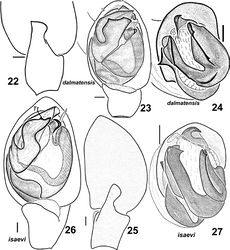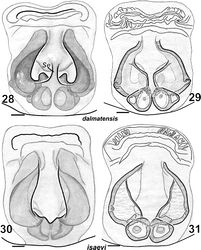Difference between revisions of "Haplodrassus dalmatensis"
m (Imported from ZooKeys) |
m (1 revision) |
(No difference)
| |
Latest revision as of 13:22, 4 July 2012
| Notice: | This page is derived from the original publication listed below, whose author(s) should always be credited. Further contributors may edit and improve the content of this page and, consequently, need to be credited as well (see page history). Any assessment of factual correctness requires a careful review of the original article as well as of subsequent contributions.
If you are uncertain whether your planned contribution is correct or not, we suggest that you use the associated discussion page instead of editing the page directly. This page should be cited as follows (rationale):
Citation formats to copy and paste
BibTeX: @article{Kovblyuk2012ZooKeys205, RIS/ Endnote: TY - JOUR Wikipedia/ Citizendium: <ref name="Kovblyuk2012ZooKeys205">{{Citation See also the citation download page at the journal. |
Ordo: Araneae
Familia: Gnaphosidae
Genus: Haplodrassus
Name
Haplodrassus dalmatensis (L. Koch, 1866) – Wikispecies link – ZooBank link – Pensoft Profile
- Haplodrassus dalmatensis: Tullgren 1946[1]: 100, pl. 16, f. 201–203 (♂♀).
- Haplodrassus dalmatensis: Miller and Buchar 1977[2]: 170, pl. IV, f. 1–3 (♂♀).
- Haplodrassus dalmatensis: Grimm 1985[3]: 138, f. 156, 164–165 (♂♀).
- Haplodrassus dalmatensis: Roberts 1985[4]: 66, f. 24a (♂♀).
- Haplodrassus dalmatensis: Roberts 1998[5]: 110, f. (♂♀).
- Haplodrassus dalmatensis: Levy 2004[6]: 23, f. 57–61 (♂♀).
- Haplodrassus dalmatensis: Almquist 2006[7]: 408, f. 352a–e (♂♀). For a complete list of references see Platnick (2012)[8].
Records from Crimea
Apostolov and Onchurov (1998)[9]; Onchurov (1998)[10]; Mikhailov (2000)[11]; Kovblyuk (2004a[12],b[13], 2006[14]); Kovblyuk et al. (2008)[15].
Material
UKRAINE, CRIMEA:Bakhchisaray Distr.: 1 ♂ (TNU), Crimean State Nature Reserve, kordon Asport, 29.06.2001, M.M. Kovblyuk. Feodosiya Distr.: 4 ♂♂, 4 ♀♀ (TNU), Karadag Nature Reserve, 25.05.2003–21.11.2008, M.M. Kovblyuk, O.V. Kukushkin, A.A. Nadolny. Saky Distr.: 5 ♂♂, 7 ♀♀ (TNU), near Pribrezhnaya railway station, 19.05.–3.07.2000, M.M. Kovblyuk. Sevastopol Distr.: 2 ♂ (EMZ), Khersones, 29.05.1996 & 19.06.1998, M.M. Kovblyuk. Simferopol Distr.: 1 ♂, 1 ♀ (EMZ), near Simferopol water reservoir, 30.05.1996, M.M. Kovblyuk; 1 ♀ (TNU), near Fersmanovo Vill., ~ 250 m, 23.06.–16.07.2000, M.M. Kovblyuk; 1 ♀ (TNU), Chatyr-Dagh, Orlinoe canyon, 10–25.06.2000, M.M. Kovblyuk; 3 ♂♂, 1 ♀ (TNU), near Skvortsovo Vill., 19.05.–10.07.2002, M.M. Kovblyuk; 1 ♀ (TNU), Krasnolesye Vill., 10.07.2002, Ya.I. Ibragimova. Sudak Distr.: 2 ♂♂, 2 ♀♀ (TNU), 10 km W Sudak, Mezhdurechie Vill., 23.05–24.06.2010, M.K. Yusufova.
Additional material
UKRAINE. Kherson Area: 1 ♂ (TNU), Henichesk Distr., Arabatskaya strelka, 4 km S Henichesk Town, 1–10.06.2010, N.A. Stasyuk; 1 ♀ (TNU), Arabatskaya strelka, 7 km S Henichesk Town, 6.07.2010, N.A. Stasyuk.
Diagnosis
Haplodrassus dalmatensis can be easily distinguished from all other congeners by the shape of the terminal apophysis with two tooth-like apical processes and by the strong tooth on the embolus in males, and also by the shape of the epigynal fovea with a peculiar medial septum and converging lateral pockets in females.
Distribution
West and Central Palaearctic: North Africa, Europe, South Urals, Caucasus, Anatolia, Near East, Kazakhstan, Western Turkmenistan and mountains of South Siberia (Mikhailov 2000[11]; Tuneva and Esyunin 2003[16]; Levy 2004[6]; Helsdingen 2010[17]).
Habitats
Juniper forests, forest strips (=shelterbelts), grasslands, steppes, meadows, salt marshes.
Phenology
In Crimea ♂♀ – V-VI, ♀♀ – VII, XI-XII, the peak of activity in adults occurs in June. In Britain, the peak is in June (Harvey et al. 2002[18]), as in Crimea. In Central Europe ♂♀ – IV-VII (Nentwig et al. 2011[19]). In Israel the phenology is very different: ♂♀ – I-IV, ♂♂ – XII, ♀♀ – V-VII (Levy 2004[6]).
Taxon Treatment
- Kovblyuk, M; Kastrygina, Z; Omelko, M; 2012: A review of the spider genus Haplodrassus Chamberlin, 1922 in Crimea (Ukraine) and adjacent areas (Araneae, Gnaphosidae) ZooKeys, 205: 59-89. doi
Other References
- ↑ Tullgren A (1946) Svenska spindelfauna: 3. Egentliga spindlar. Araneae. Fam. 5–7. Clubionidae, Zoridae och Gnaphosidae. Entomologiska Foreningen, Stockholm, 141 pp.
- ↑ Miller F, Buchar J (1977) Neue spinnenarten aus der gattung Zelotes Distel und Haplodrassus Chamberlin (Araneae, Gnaphosidae). Acta Universitatis Carolinae – Biologica 6: 157-171.
- ↑ Grimm U (1985) Die Gnaphosidae Mitteleuropas (Arachnida, Aranei). Verlag Paul Parey, Hamburg and Berlin, 318 pp.
- ↑ Roberts M (1985) The spiders of Great Britain and Ireland, Volume 1: Atypidae to Theridiosomatidae. Harley Books, Colchester, 229 pp.
- ↑ Roberts M (1998) Spinnengids. Tirion, Baarn, 397 pp.
- ↑ 6.0 6.1 6.2 Levy G (2004) Spiders of the genera Drassodes and Haplodrassus (Araneae, Gnaphosidae) from Israel. Israel Journal of Zoology 50: 1-37.
- ↑ Almquist S (2006) Swedish Araneae, part 2 – families Dictynidae to Salticidae. Insect Systematics and Evolution 63: 285-601.
- ↑ Platnick N (2012) Gnaphosidae_The World Spider Catalog, Version 12.5 (Fam. Gnaphosidae Pocock, 1898) http://research.amnh.org/entomology/spiders/catalog/GNAPHOSIDAE.html
- ↑ Apostolov L, Onchurov M (1998) New taxa in araneofauna of Crimea. SGU, Uchenye zapiski. Biologia. Matematika. Psikhologia. Fizicheskaya kultura. Fizika. Khimia 5: 3-6. [in Russian]
- ↑ Onchurov M (1998) Revision of the araneofauna of Crimea. Ekosistemi Krima, ikh optimizatsia i okhrana. Tematicheskiy sbornik nauchnikh trudov Simferopolskogo gosudarstvennogo universiteta 10: 45-47. [in Russian]
- ↑ 11.0 11.1 Mikhailov K (2000) Catalogue of the spiders (Arachnida, Aranei) of the territories of the former Soviet Union. Addendum 3. Zoological Museum, Moscow State University Moscow, 33 pp.
- ↑ Kovblyuk M (2004b) Preliminary results of spiders fauna and biotopic distribution of spiders in Karadag Nature Reserve study. National Academy of Sciences of Ukraine. Karadag Nature Reserve. Annals 20: 139-145. [in Russian]
- ↑ Kovblyuk M (2006) Gnaphosid spiders (Arachnida: Aranei) in Crimean fauna. Abstract of PhD thesis, Kyiv, Ukraine: Institute of Zoology Ukrainian Academy of Sciences. 22 p. [in Ukrainian]
- ↑ Kovblyuk M (2011) Catalogue of the spiders (Arachnida: Aranei) of the Crimea. Version 1.0. http://arachnology.kz/Crimea/Catalogue_11.11.2011_Crimea.htm
- ↑ Kovblyuk M, Kukushkin O, Gnelitsa V, Nadolny A (2008) Brief atlas of spiders (Arachnida, Aranei) of Karadag Nature Reserve. N.Orianda, Simpheropol, 120 pp.[in Russian]
- ↑ Tuneva T, Esyunin S (2003) A review of the Gnaphosidae fauna of the Urals (Aranei), 3. New species and new records, chiefly from the South Urals. Arthropoda Selecta 11 (3): 223-234.
- ↑ Helsdingen P (2010) Fauna Europaea: Araneae. Database. Version 2.2 [www.european-arachnology.org www.european-arachnology.org]
- ↑ Harvey P, Nellist D, Telfer M (Eds) (2002) Provisional atlas of British spiders (Arachnida, Araneae). Volumes 1 & 2. Biological Records Centre, Huntington, 406 pp.
- ↑ Nentwig W, Blick T, Gloor D, Hänggi A, Kropf C (2011) Spiders of Europe. [www.araneae.unibe.ch www.araneae.unibe.ch]
Images
|

